In part four of this eight-part series, the implications of the Supreme Court decision in NYT v. the US leave Sen. Mike Gravel in more legal peril as he contemplates publishing the Papers outside of Congress.
This is Part 4 of Consortium News’ multi-part series on the 50th Anniversary of Sen. Mike Gravel obtaining the Pentagon Papers from Daniel Ellsberg and the consequences Gravel faced for revealing the top secret documents in Congress, just hours before the Supreme Court decided the case on June 30, 1971.
In Part One, Gravel brought the Papers to Capitol Hill to make them public by reading them into the Congressional Record. In Part Two, Gravel gets the papers from Ellsberg through an intermediary. Part Three tells the story of Gravel’s emotional reading of the Papers.
The excerpts published here are from the book A Political Odyssey by Sen. Mike Gravel and Joe Lauria (Seven Stories Press). It is Gravel’s story told to and written by Lauria.
Part Four: A Pyrrhic Victory
By Mike Gravel and Joe Lauria
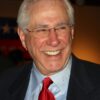
 I propped myself up on an elbow as the announcer read the news: The Supreme Court ruled, 6-3, against Nixon. The government’s unprecedented move to stop the presses had failed. The Court agreed with two lower courts that the attempt to impose prior restraint on the press was unconstitutional.
I propped myself up on an elbow as the announcer read the news: The Supreme Court ruled, 6-3, against Nixon. The government’s unprecedented move to stop the presses had failed. The Court agreed with two lower courts that the attempt to impose prior restraint on the press was unconstitutional.
The ruling turned out to be more complex than at first glance, but it was an unequivocal call for Constitutional constraint on an out-of-control control executive. The Court challenged the executive’s misuse of “national security” as a mantra to undermine the Bill of Rights and accrue quasi-dictatorial powers. Writing for the majority, Justice Hugo Black boldly took on Nixon’s nonsense:
“To find that the President has ‘inherent power’ to halt the publication of news by resort to the courts would wipe out the First Amendment and destroy the fundamental liberty and security of the very people the Government hopes to make ‘secure.’ No one can read the history of the adoption of the First Amendment without being convinced beyond any doubt that it was injunctions like those sought here that Madison and his collaborators intended to outlaw in this Nation for all time.”
In case the White House didn’t get the point, Justice Black, a 1937 FDR appointee, explained:
“The word ‘security’ is a broad, vague generality whose contours tours should not be invoked to abrogate the fundamental law embodied in the First Amendment. The guarding of military and diplomatic secrets at the expense of informed representative government provides no real security for our Republic. The Framers of the First Amendment, fully aware of both the need to defend a new nation and the abuses of the English and Colonial governments, sought to give this new society strength and security by providing that freedom of speech, press, religion, and assembly should not be abridged.”
Against Monarchy
The New York Times ruling was truly historic and I’ve always viewed it as such. The United States was founded after a violent rebellion and insurgency against a repressive kingdom and empire. The revolution wasn’t just against the British kingdom, but against monarchy itself. The Supreme Court in the Times case reminded the country that the Constitution mandates Congress, the courts, and the press to vigilantly prevent the executive sliding into monarchical behavior.
The Constitution does bestow some kingly powers on the president: he is both symbolic head of state and practical head of government. The American president is also commander-in-chief of the armed services, and he can pardon convicted criminals and veto bills. Some presidents, like Nixon, Bush, and even Bill Clinton have found it hard to resist the temptation toward monarchy. None have dared conjure an emergency to suspend the Constitution. They have just worked around it.
But they’re tyrants, according to Jean-Jacques Rousseau’s definition in The Social Contract:
“In the exact sense, a tyrant is an individual who arrogates to himself the royal authority without having a right to it. This is how the Greeks understood the word ‘tyrant’: they applied it indifferently to good and bad princes whose authority was not legitimate.”
There’s a long tradition of accusing presidents of acting like monarchs: Andrew Jackson was called “King Andrew the First,” and Dubya’s been dubbed “King George.” For two centuries some courageous Americans in and out of Congress, the courts, and the press have struggled against unconstitutional power creeping into the White House. It’s not been easy in peacetime.
But the worst executive abuses have naturally come during war: from land grabs against Native Americans to the invasion of Iraq. James Madison, the Constitution’s architect, warned:
“Of all the enemies of true liberty, war is, perhaps, the most to be dreaded…. No nation can preserve its freedom in the midst of continual warfare. War is in fact the true nurse of executive aggrandizement. In war, a physical force is to be created; and it is the executive will, which is to direct it.”
To defend the Constitution, Madison says, is to challenge this leviathan that is monarchical power. I have dedicated my life to it, from Vietnam to Iraq. It has been an unforgiving adversary. Sometimes a too powerful executive, especially with modern public relations techniques, manipulates the people’s mood against Congress, the courts and the press, the very institutions the founding document says must defend the majority against presidential ambition.
The people’s representatives have let us down time and again, representing not their interests but their elite backers instead. The people are without the kind of Congress or a press it would need to defend itself. Both have been hijacked. Just look at how poorly Congress, the courts, and the media confined George W Bush to his constitutional role.
When I was a senator I still believed representative government and the news media could fulfill their constitutional duties, though as an insider I was beginning to have my doubts. I was learning just how the system works and whom it serves. Since the National Security Act of 1947, the executive’s power has expanded dangerously with new departments and agencies while the increasingly influential money clique has neutralized Congress and the press.
So if Congress and the media won’t defend the majority against this hyper-executive, then average Americans will have to do it on their own. I started as early as 1971 to call for a national Town Hall to defy an “oppressive” executive. Today I’m convinced citizens can best defend their national interests by ignoring Congress and making their own laws through ballot initiatives, as they do already in twenty-four states. People are starting to take control of journalism, too, ignoring the bought media, through blogs and websites like YouTube.
To Serve the Governed
As Justice Potter Stewart wrote in his New York Times opinion, “The only effective restraint upon executive policy and power … may lie in an enlightened citizenry–in an informed and critical public opinion which alone can here protect the values of democratic government.”
Justice Black, in his final opinion before dying three months later, made clear what the Constitution says the press should do:
“In the First Amendment the Founding Fathers gave the free press the protection it must have to fulfill its essential role in our democracy. The press was to serve the governed, not the governors. The Government’s power to censor the press was abolished so that the press would remain forever free to censure sure the Government. The press was protected so that it could bare the secrets of government and inform the people. Only a free and unrestrained press can effectively expose deception in government. And paramount among the responsibilities of a free press is the duty to prevent any part of the government from deceiving the people and sending them off to distant lands to die of foreign fevers and foreign shot and shell.”
It is hard to imagine today’s self-important media, owned by a handful of rapacious corporations and run by enabling journalists, fully appreciating Black’s view. With the failure of most reporters and editors to challenge the flimsy case the Bush administration made for invading Iraq, doesn’t it seem the self-styled centrist media willingly serves the governors, rather than the governed? Careerism may drive the individual reporter, but the larger problem is a few powerful corporations cozying up to government and controlling information to further corporate interests, not society’s.
Few journalists are courageous enough, or permitted, to tell that story. But even in the days of the Burger Court the press did not really exhibit all the courage it credited itself with. The Times claimed it got the Papers through “investigative reporting” when Ellsberg handed them excerpts. There was no digging for them.
According to Dan, the Times then used deception to get the entire copy. So the paper got the glory, but how much did it really stand up to the executive? As soon as prior restraint was imposed, that is, stopping publication before it occurs rather than punishing it afterward, The New York Times and The Washington Post caved. They stopped publishing. People were dying in vain. They had the Papers but they obeyed Attorney General Mitchell’s court-obtained order. They could have defied the Justice Department, let the FBI march into their newsrooms rooms and arrest the editors. That would have been a story.
An ‘Uncertain’ Victory
Instead the newspapers focused on their liability before the country’s interests. They acted as corporations, not guardians. Even after two lower courts overturned the injunction saying the Times could continue publishing without delay–decisions the Supreme Court ultimately upheld–the Times still didn’t resume publication. Even after the Supreme Court ruled, the Times remained unsure of its success.
“There was some uncertainty whether the press had scored a strong victory or whether a precedent for some degree of restraint had been set,” the paper reported. Yet a clear majority said the executive failed to prove restraint was needed to protect “national security.” Once restraint was lifted both the Times and the Post resumed publishing the few articles they had in the can before the restraining order.
Then on July 5, the Times suddenly stopped. It had published a series of nine articles in all, with supporting excerpts and sidebars–six after the order was lifted. The Washington Post published for just four days after the ban was lifted. About a dozen other newspapers to whom Ellsberg had also leaked stopped even earlier.
This puzzled and annoyed me. I had released reams of new pages of the study and the papers ignored them. Why had they suddenly stopped publishing when pressure had to be maintained on the administration to end the war? There may have been one reason why they stopped publishing.
Several of the justices and two very specifically, Potter Stewart and Byron White, said though prior restraint was overruled, newspapers were not “immune from criminal action” for publishing. White wrote:
“Failure by the Government to justify prior restraints does not measure its constitutional entitlement to a conviction for criminal publication. That the Government mistakenly chose to proceed by injunction does not mean that it could not successfully proceed in another way.”
Invoking the Espionage Act
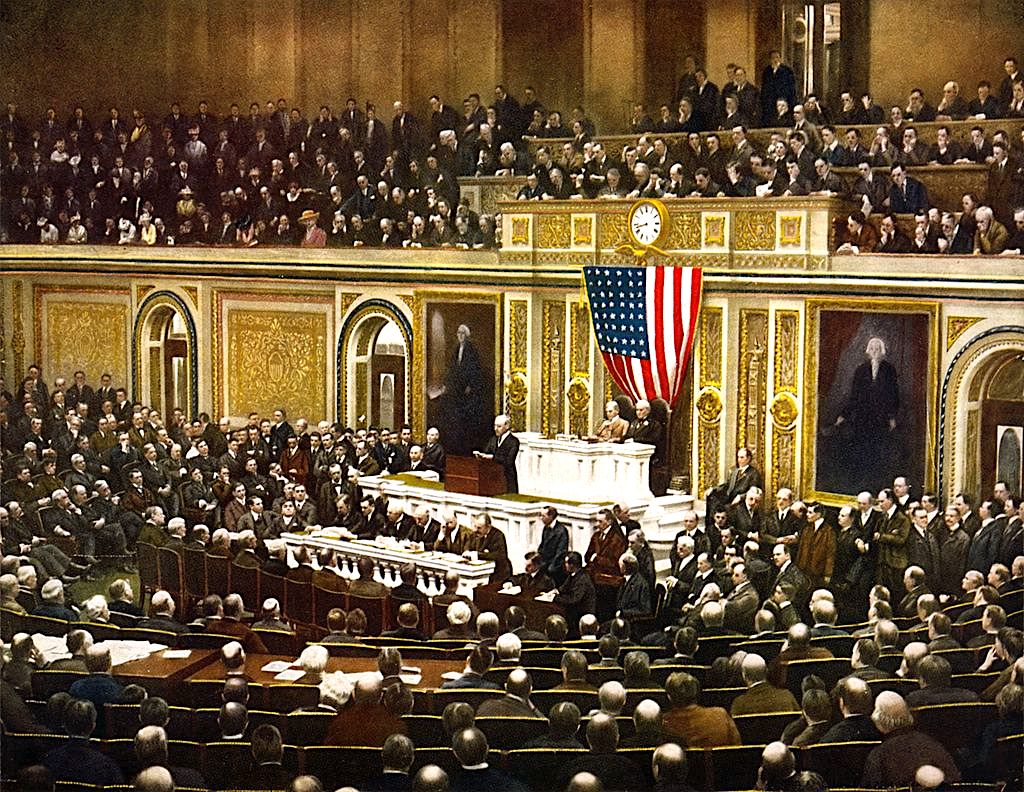
Woodrow Wilson asking Congress to declare war on Germany, April 2, 1917, the day the Espionage Act bill was introduced to the Senate. (Colorized photo, Wikimedia Commons)
It was an astonishing footnote to the ruling. White had to dig back to another war and another repressive executive to reach this conclusion. He cited the 1917 Espionage Act, pushed through Congress by one of our most awful presidents, Woodrow Wilson. Wilson’s assault on liberty during World War I was in the same league with Nixon’s during Vietnam and with Bush’s during his perpetual War on Terror. Wilson feared domestic opposition to the first global war would undermine the American effort, so his Act criminalized conveying information that hindered U.S. armed forces or promoted the enemy.
As a result, numerous prominent dissidents were thrown in jail. Seventy-five newspapers lost their privilege to use the U.S. mail. Eugene V. Debs, who ran for president five times in all as the Socialist Party candidate, was convicted for making an anti-war speech in Ohio in 1918. He appealed to the Supreme Court. He lost–the Court said his speech called for obstruction of recruitment and the military draft. Debs was thrown in the slammer for ten years. Behind bars in an Atlanta federal pen in 1920, he still got nearly a million votes for president. The man who won, Warren Harding, commuted Debs’s sentence the next year.
Wilson had sought even broader powers to silence speech in the Espionage Act. But Congress stood up to him, only making punishable revealing current information about military installations, and communications. Undaunted, Wilson pushed through the Sedition Act in 1918, which made it a crime to use “disloyal, profane, scurrilous, or abusive language” about the government, the flag or armed services during war. It was wisely repealed in 1921.
The Supreme Court has struck down parts of the Espionage Act over the years, but much of it remains on the books. That is a chilling thought. It was just what George W. Bush needed. Under his secretive administration, the Patriot Act and the Military Commissions Act have given the executive–with its modern-day size and reach through the Pentagon, various departments and intelligence agencies–unprecedented power to monitor Americans, suspend habeas corpus, and gut international law. Bush has propelled militarism and authoritarianism, long an unfortunate feature of our history, to a critically advanced stage.
Nixon used the guts of Wilson’s Act to try to punish those involved with the Papers. It specifically forbids someone with a document “relating to the national defense … willfully to communicate or cause to be communicated that document to any person not entitled to receive it.” It also makes it a crime “to retain the document and fail to deliver it to an officer of the United States entitled to receive it.”
I believed that as a Senator I was entitled. The executive obviously didn’t agree. On cue, the day after the Court’s hint of criminal proceedings, Mitchell said the Justice Department was “continuing its investigation and will prosecute all those who have violated Federal criminal laws.”
The Court was not unanimous on criminality. Justice William Douglas, another FDR appointee, said the criminal statues from the Espionage Act did not relate to the press at all, but to spies or others revealing operational data only. Ellsberg said the Papers, which were already history when he released them, had no operational intelligence. Neither did it reveal U.S. codes. Ellsberg even refused to leak diplomatic cables that detailed negotiations.
One reason I spent days reading the Papers at home with my staff and hired Leonard Rodberg as my aide was to root out such information if it were found. But Nixon, after losing prior restraint, essentially tried to impose censorship through criminal proceedings. Within days of the ruling, the Justice Department asked a federal grand jury in Boston to subpoena reporters. The grand jury weighed criminal charges against the Times, the Post, and The Boston Globe. Neil Sheehan, the Times reporter Ellsberg leaked the Papers to, and his wife, were subpoenaed.
“Anyone on the Times, the Post or the Globe is potentially liable to a charge of receiving stolen government property,” a Government official told Time magazine. Justice even threatened Katharine Graham, the Post‘s publisher, with prosecution. This is when the articles stopped.
Meanwhile, my copy of the Papers sat unprinted in the subcommittee office. The public was being shut out from further revelations. Here was an overreaching executive using the strong-arm tactic of a criminal investigation to freeze free speech and using a politically motivated prosecutor and grand jury to try to nail those daring to expose the executive’s crimes in Southeast Asia since the Second World War.
Even before the New York Times decision was reached, Nixon was planning a criminal investigation that would interrogate everyone involved with the aim of putting Ellsberg and anyone else who had helped him in jail. According to the White House tapes, eight days before the Court’s decision, on June 22, 1971, Nixon told John Ehrlichman (his domestic affairs advisor), Ron Ziegler (his press secretary), and others in the Oval Office: “Get the [press] injunctions procedures over with. We’re going to lose that. We lose, we move immediately to the criminal prosecution … of Ellsberg.”
On the afternoon the Times decision was read, Nixon said: “Don’t you agree that we have to pursue the Ellsberg case now? … Let’s get the son-of-a-bitch into jail.” Henry Kissinger can be heard on the tape saying: “We’ve got to get him.” Dan’s trial would begin in Los Angeles in 1973. Eventually the criminal investigation in Boston against the newspapers papers ended with no indictments.
But the executive got what it wanted: The criminal probe dampened the euphoria over the Supreme Court ruling, casting a chill in newsrooms across the country.
© Mike Gravel and Joe Lauria
Tomorrow: Gravel arranges with Beacon Press in Boston to put out the Pentagon Papers and goes to the Supreme Court to defend the publisher.
Mike Gravel served in the U.S. Senate for two terms representing Alaska from 1969 to 1981. In his second year in the Senate Gravel publicly released the Pentagon Papers at time when newspaper publication had been shut down. Gravel is a fierce opponent of U.S. militarism and ran for the Democratic Party nomination for president in 2008 and 2020.
Joe Lauria is editor-in-chief of Consortium News and a former UN correspondent for The Wall Street Journal, Boston Globe, and numerous other newspapers. He was an investigative reporter for the Sunday Times of London and began his professional career as a stringer for The New York Times. He can be reached at joelauria@consortiumnews.com and followed on Twitter @unjoe

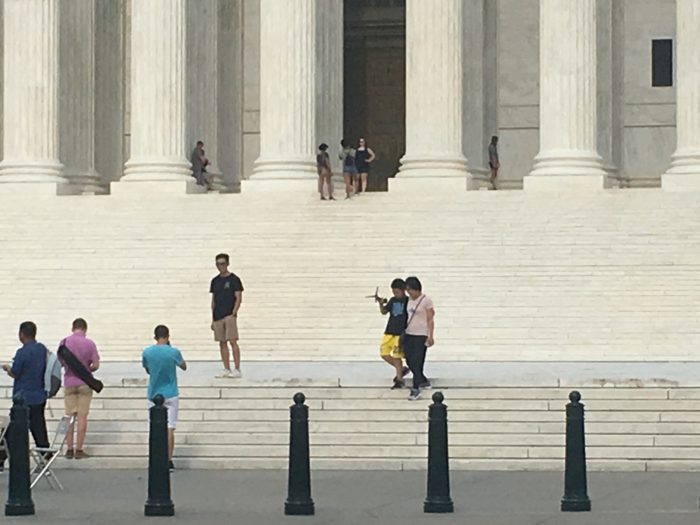
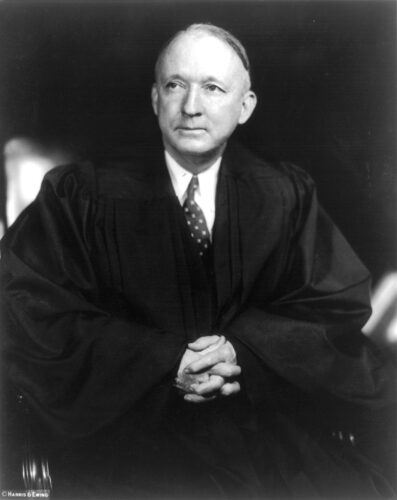
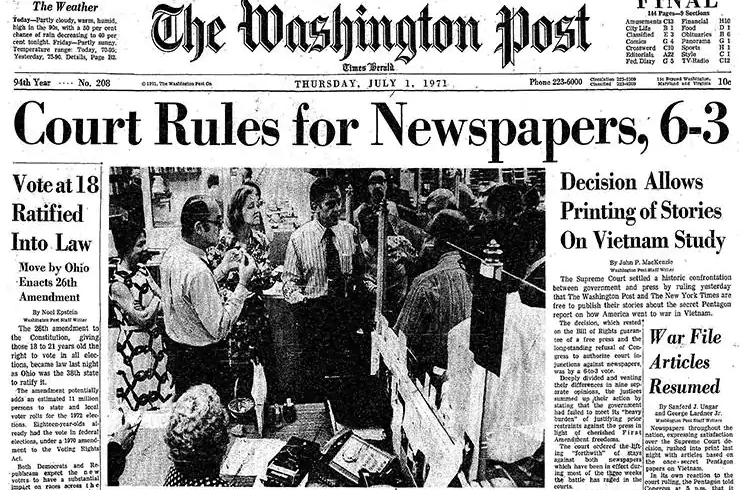
Right on the money, CN.
I seem to remember King Geo the Younger claiming ol’ Woodrow as his admired presidential model. Makes sense after reading this.
Remember when the mantra (or would that be meme) was often bandied about that this, that or just about any institution in the good ol’ U.S. ought to be run “like a business” if you want it run right (esp. government but also education, health care, protection of common resources, any quarter perceived as slowing down the juggernaut for profits)? Well, dear motherfreakers who pined for that outcome, take a good look all around. This is your wet dream come true. Good luck scouring out an infection whose primary purpose has become for those in control to create their own nest eggs and then protect them at all costs. Come hell or high water. Or both at the same time I guess is also possible.
“Well the fog’s so thick you can’t spy the land. The fog is so thick you can’t even spy the land. What good are you anyway if you can’t stand up to some old businessman.” Bob Dylan/from “Summer Nights”
Dear Joe Lauria and team,
I never got engaged with much of my own lifetime’s history. Until now. Your serial articles on the Pentagon Papers history, especially Dan Ellsberg’s and Mike Gravel’s parts of it has me riveted. I am learning as in a class should have done. Also your fabulous coverage of any Julian Assange (& remarkable families’) updates leave me speechless with disgust for the uselessness of our senators, congress and DOJ. Gabriel’s reading of the first chapter of “Cypher Punks” just helped me hear the great value of Julian’s signature voice in his writing. No wonder he is such a beloved visionary force for good! I am going to send as much as I dare from my fixed income. Because of the great work you-all do all the time. I only wish I could send more to encourage the writers and presenters. Aaron Mate’s impeccable and moving speech at the Home Run for Julian deserves a huge grant/award/ & to be sent to every single congress member and senator! Caitlyn Johnstone’s only getting better and clearer in her encouragement to do things differently. Thank you, for all of you behind the scenes and guests too! Ray McGovern is my hero, so is John Kiriakou and my gosh, Suzi Dawson! Please keep Kevin Gosztola and Richard Medhurst going too. And of course, Chris Hedges! Thank you to Elizabeth L.Vos and Cathy Vogan. Much, much love and appreciation. -T.
Thank you very much for your comment and your support.
Dear Joe and Mike,
“They could have defied the Justice Department, let the FBI march into their newsrooms rooms and arrest the editors. That would have been a story.”
Indeed. For they are corporations rather than a collection of principled reporters, though some may be allowed. As John Pilger says, those spaces for alternative voices have evaporated in the MSM, and you rightly observe that it is independent media which has filled that space. Because that “indy media” is so cheap to produce its full of poorly informed opinion and deliberate government produced psy-ops, amongst the treasures to be found. I trust people to make their own judgements.
I’m doing my own bit, with a tiny blog, calling things as I see it, with references, as some of the US’s great journalists have (RIP, Izzy, Parry) and continue do (Hi, Mate). I am not in their league, but am engaging in free speech and public discourse all the same.
I look forward to the next installment.
Thanks again for this trip back in time in a way as well as this reflection of the current times.
~
The thought that comes to mind is “history repeats itself”, but I would add this: “until it doesn’t”.
~
I think, I really do, that we have entered the “until it doesn’t” phase. I have no freaking idea what is gonna happen next, but as I told my father-in-law a few days ago, and by the way, he fought in Vietnam – in fact, he is a Colonel, and he is the toughest man I know. I said to him, something has got to change. I said – it is time for a Constitutional Convention. He knew about Article V and while he didn’t agree or disagree, I discussed with him, man-to-man, my ideas.
~
Peace is easy.
BK